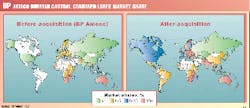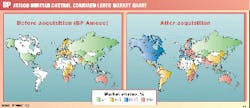BP Amoco makes strategic lubes acquisition
BP Amoco PLC has agreed to buy lubricants giant Burmah Castrol PLC, Swindon, UK, for £3 billion ($4.7 billion). The news comes about 3 months after BP Amoco and ExxonMobil Corp. agreed to dissolve their European fuels and lubricants joint venture in order to satisfy the European Commission's conditions for the merger of Exxon Corp. and Mobil Corp.
BP Amoco said the acquisition "will bring BP Amoco millions of new customers, giving the combination access to emerging markets where BP Amoco currently has a limited presence and making Castrol products available to BP Amoco's massive customer base worldwide." Upon completion of the acquisition, Castrol will become BP Amoco's leading lubricants brand.
Both companies' boards have approved BP Amoco's offer of £16.75/ share for Castrol stock.
BP Amoco said it expects the deal to result in pretax cost savings of about $260 million/year by 2003, mainly from eliminating duplication in logistics, procurement, and support services, together with a worldwide staff reduction of about 1,700 from the combined operations. The layoffs will account for about half the savings.
Implementation costs are expected to be about $390 million, all of which will be taken as a charge in 2000. BP Amoco estimates the payback period for this charge at 2-3 years.
Burmah Castrol generated operating profits, before exceptional items, of £284 million in 1999. Of this, £213 million was contributed by the Castrol division and £79 million by Burmah Castrol's specialty chemicals businesses. BP Amoco expects to dispose of the specialty chemicals operations, although this is subject to review.
"In all the other aspects of the business-distribution, supply, administration, and overheads-we see significant synergies...," said BP Amoco CEO John Browne.
The combination
The lubricants businesses of the two companies will be merged to form a new lubricants division run by a management team drawn from both companies. The division will be based in Swindon.
BP Amoco Group Vice-Pres. David Baldry will head the division, and Castrol will be the division's flagship brand, he says.
Browne explained Castrol's appeal: "Castrol...has a track record of growing its sales faster than the market, particularly in emerging economies such as India, Asia, and Latin America. Put simply, the combination will add millions of new customers worldwide and give BP Amoco access to emerging markets where we currently have a limited presence.
"For BP, this represents a significant further step in the development of the downstream strategy since it became obvious 15 months or so ago that the BP-Mobil joint venture would come to an end," Browne said.
"The scale of the potential synergies is important, but they are not the main driver behind this transaction. The attraction is growth...We're buying a ...business that gives us a platform for growth and which fits extremely well with our conception of the evolving market-the shift to gas, to clean fuels, and to high-quality oil products and services."
Baldry points out that the firms' lubes businesses fit together well, "in both a sector and a geographic sense." BP Amoco has some significant strengths in parts of the Southern Hemisphere and a moderate position in Europe, where its market share is about 6% (taking into account the dissolution of its JV with Mobil) and its product slate is biased towards the commercial automotive sector. But BP Amoco is underrepresented in lubricants in the Americas and other key growth areas, says Baldry.
Castrol-brand lubricants have a global market share of about 5%. "The new enterprise takes us to number two in Europe [from number four], with an overall market share of 13% and a far more balanced sector portfolio," Baldry said.
In North America, neither BP nor Amoco had a material lubricants position, while Castrol has developed its position in the US and Canada over the past decade, Baldry said: "Looking at the rest of the world...this new combination enables us to achieve critical mass in many key markets, but perhaps most excitingly, it is also present in high-growth areas such as India, China, and parts of Latin America."
In addition to the market share benefits, said Baldry, "The deal also supports the implementation of key aspects of our downstream strategy, which, in addition to earnings growth, are to expand our customer base, broaden our customer offerings, and optimize our manufacturing capacity."
Castrol also has in-house research and development capability, Baldry points out. "Perhaps the best example is their success in developing their top-of-the-range synthetic lubricant products."
Looking to the future, said Baldry, "We also expect to form innovative marketing approaches, providing wider solutions for our customers through service-oriented offers and e-commerce activities."

